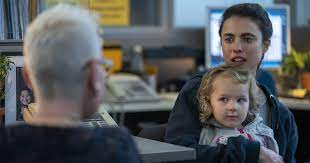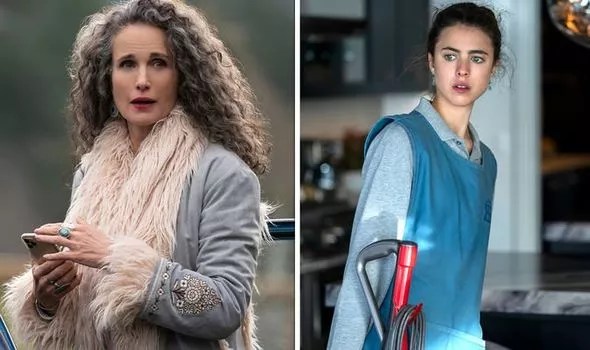

The holidays are built for binge-watching, with the big blocks of “down time” taking the form of working your tail off to cook, clean for and keep visiting family entertained.
OK, you get to “Maid” your way, I (finally) get around to it mine.
Viewers have responded to this often-gripping account of a single mother struggling with homelessness, escaping an abusive relationship and coming to terms with a family legacy that has seemingly always-included those burdens, a series based on the memoir of a Montana mom — Stephanie Land — who experienced the grim nuts-and-bolts of what we see on the screen.
By that I mean the bureaucracy, the paperwork, the simple logistics of living out of your car with a toddler and finding some safe place for her to be while you deal with every Catch-22 of your situation.
You’ve got to have a job to qualify for housing aid. You need to have filed a police report to get certain forms of help. The best job available to the under-educated and unqualified is maid work, and even working for a contract maid service costs the employee money (cleaning supplies) and requires a car.
The average American sees people like this every day, uniformed and haggard, over-stuffed cars often carrying their every portable possession. The dead give away? They bear the look of someone uncared for.
Such people rarely look like Margaret Qualley, the “Once Upon a Time…in Hollywood” breakout, a model-thin beauty with her mother Andie MacDowell’s cheekbones, hair and eyes, if not her glamorous sheen.
But in casting Qualley as Alex, the impoverished young woman facing such dire straights, series creator Molly Smith Metzler scores not just a terrific actress for her lead, but makes a point of avoiding the stereotypes of this sort of woman dealing with this sort of poverty. They aren’t just Black or LatinX, rural and Southern.
You can’t always see “poor decisions” written in their appearance or inked all over their arms like Land’s.
We meet Alex as she’s fleeing the trailer she shares with now-ex-partner Sean (Nick Robinson of “Love, Simon” and TV’s “Love, Victor”), a rageaholic drunk who works as a bartender.
That first night showing us a very young woman with a two year-old (Rylea Nevaeh Whittet) impulsively discovering that her “support system” is irresponsible, party animal peers from the coastal Washington state bar scene, or her flakey, narcissistic artist-mom (played by Qualley’s real-life mother, MacDowell).
There is no safe harbor. They’re stuck in the car. The coming episodes will serve up a series of obstacles, the Catch-22s I mentioned earlier, as Alex and little Maddy fend off the dangerous but clingy Sean and slowly hoist themselves into “the system.”
Alex sees a running tally of her $18-and-shrinking finances and imagines judgement in every “clean up on aisle POOR” (how she hears it) sales clerk or “poor white trash” and worse from the social services worker (Amy Reid) who points out every hoop she must jump through, with an implied “every thing you’ve ever done wrong” in her questions.
“Are you on drugs? Can you prove” that’s your little girl?
“I can show you my stretch marks!”
As she “can’t do squat” without a pay-stub, Alex takes social worker Jody’s recommendation to try Value Maids. As Yolanda (Tracy Vilar) testily lists all the ways this job won’t actually support her and her daughter, Alex is adding up the net, gross and overhead of work that looks, right from the start, like indentured servitude — a poverty trap.
And if that aloof, first under-paying wealthy client (Anika Noni Rose) whose house requires a long, pricey ferry ride to her tony island mansion takes it on herself make Alex’s life harder by rejecting the work to her boss, that means a late-night return trip on said ferry to said island.
That’s when the generally complacent Maddy acts out, and that’s how Alex makes one more bad decision that ends in a car wreck, leaving them not just homeless but carless.
I love the way Metzler (“Shameless,” “Casual” and “Orange is the New Black” credits) and her writers lay out the nuts-and-bolts of poverty in America, showing us a “system” staffed by generally compassionate women (BJ Harrison runs a shelter) who, like “sponsors” in AA, can’t do the work for you.
This world of dollar store cleaning supplies — and toys for the toddler — tiny dollops of gas to get you from job to job and then having to deal, one-on-one, with rich, luxuriously-appointed and well-fed clients who only cheap-out on paying their servants, will depress any compassionate viewer of “Maid.”
The scripts take pains to show Alex’s one-time writing ambitions, but skimp on the string of decisions that she made that helped put her here. Flashbacks show us her days waitressing in a bar, Sean showing up with a book and thus getting her attention, and the unplanned pregnancy that punched an unhealthy young romance right in the gut.
Sean’s “emotional violence” — threats, “control” etc. — is played-up here, covering new dramatic and legal ground when such characters are generally captured after the physical abuse has started.
“Before they bite, they bark,” shelter-manager Denise (Harrison) warns.
But if anything, “Maid” sugar coats the harsh realities of Alex’s lot. Her ex, his mean “oxy-addict” mother and a lawyer they hire take her child away. Alex is lost in court, hearing the lawyer and the judge’s exchanges as a quacking “Legal legal legal legal” in her head.
She gets Maddy back too easily. A wealthier old friend who crushes on her and gives her a well-cared for old Ford Explorer. The mean rich lady softens. As fresh obstacles rise up, we never lose the sense that Alex will easily rise above them, and never for a second give away the grime and wear people in these circumstances carry on their faces.
And for all the pains the series goes to in avoiding serving up the caricatured abuser, uncaring social worker or what have you, none of that applies to MacDowell’s mother figure. Paula is a hippy-dippy free-spirit so wrapped up in herself and her new — younger and “Australian” — man (Toby Levins) that she can barely take a breath to show her child and grandchild the compassion they deserve, by instinct.
Paula’s exaggerated flightiness, casual cruelty and unwillingness to accept her daughter’s dire read on her situation aren’t reflected in Alex in any direct apple-tree sense. Metzler is willing to judge the hell out of the mother, and unwilling to judge the daughter at all?
Less colorful yet more interesting is the way Alex’s father (Billy Burke of the “Twilight” saga) tries to help, but with Alex giving us plenty of hints as to why there are limits to what she’ll accept from him.
“Maid” has textbook “abusive relationship” foreshadowing (Women fall back into situations they’re escaping from many times before managing that final break.), journalistically-detailed dissections of “the system” and an engaging, empathetic leading lady in Qualley.
Qualley and Metzler give us a heroine too smart to ever mistakenly believe that the abuse is her fault, that her circumstances cannot be overcome and that if the supportive strangers surrounding her could do it, that there’s any reason she won’t be able to either.
Rating: TV-MA
Cast: Margaret Qualley, Andie MacDowell, Nick Robinson, Anika Noni Rose, BJ Harrison, Tracy Vilar, Billy Burke and Rylea Nevaeh Whittet
Credits: Created by Molly Smith Metzler, based on the memoir “Hard Work, Low Pay and a Mother’s Will to Survive,” by Stephanie Land. A Netflix release.
Running time: 10 episodes @40-50 minutes each

